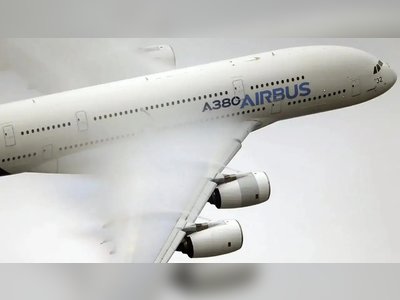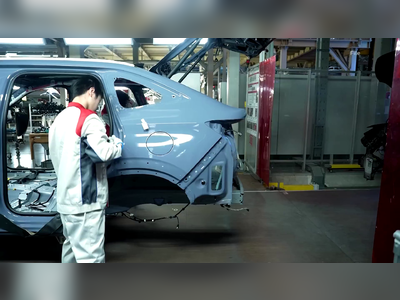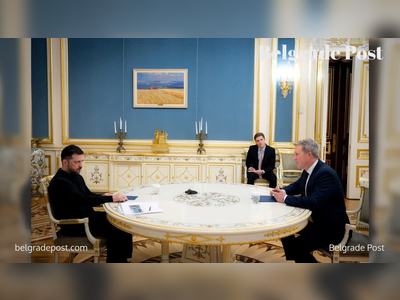
France Strengthens Ties with Vietnam Through Major Defense and Aviation Deals
French President Macron secures significant agreements with Vietnam, including a substantial order for Airbus aircraft and collaborations in defense and infrastructure.
French President Emmanuel Macron made his first visit to Vietnam in nearly a decade, establishing several important contracts across sectors including aviation, defense, nuclear energy, and transportation.
The most notable agreement involves a purchase of 20 Airbus A330neo aircraft by Vietnamese budget carrier VietJet.
Additional contracts were signed related to Earth observation satellites, as well as developments in rail and maritime infrastructure, and vaccine supplies from Sanofi.
Vietnam is responding to pressures from Washington to increase imports from the United States in order to reduce its trade surplus.
In light of this, there are unconfirmed reports that the country is considering acquiring over 250 Boeing aircraft.
Despite these pressures, Airbus remains the primary aircraft supplier to Vietnamese airlines, with CMA CGM, a French shipping giant, planning to construct a container terminal in northern Vietnam, an undertaking estimated at $600 million, slated for completion by 2028.
During his visit, Macron emphasized the importance of freedom of navigation in the South China Sea, a critical issue for Vietnam given the ongoing tensions with China.
On a different economic front, Serbia's state-owned gas company has confirmed a new gas arrangement with Russia, guaranteeing 6.1 million cubic meters of gas per day at a price of €290 per cubic meter.
The Serbian government has assured that gas prices for households will remain stable for the foreseeable future, while costs for the industry may decrease further.
This gas agreement is an extension of Serbia's existing supply deal with Russia, which expires at the end of May. Current market conditions indicate that natural gas prices are fluctuating, with a price of €360 per 1,000 cubic meters noted on the TTF exchange.
Serbian officials have expressed confidence in their winter gas supplies, with substantial reserves planned for storage ahead of the heating season.
In the automotive sector, Kumho Tire, South Korea's leading tire manufacturer, is considering Serbia for its first manufacturing facility in Europe.
The company has narrowed its options to Poland, Serbia, and Portugal for a planned investment exceeding $703 million by 2027. Kumho aims to finalize the site selection after assessing geopolitical and trade conditions, including U.S. tariffs on automotive parts.
Poland has garnered attention for its impressive economic trajectory, reportedly on track to surpass Japan in GDP per capita adjusted for purchasing power.
The latest World Bank data indicates that Poland's GDP per capita is $49,464, marginally below Japan's $50,206.
In the past twenty years, Poland's economy has doubled, now representing 82% of the EU average.
The economic evolution of Poland from a communist regime to a thriving market economy has been attributed to rapid reforms and integration into the European Union.
The government has successfully maintained a low unemployment rate, and growth is expected to continue with projected increases driven by European funding initiatives.
Despite declining global oil prices, Serbia has experienced rising fuel costs amid regulation challenges.
The Secretary General of the Association of Oil Companies in Serbia stated that state taxes account for approximately 58% of the retail price of gasoline.
The current pricing dynamics indicate a complex relationship between international crude oil costs, local taxation policies, and market pricing mechanisms.
In a separate legal matter, the European Consumer Organisation (BEUC) has announced legal action against seven airline companies over the illegal charging of fees for hand luggage.
Supported by 16 consumer rights organizations across 12 countries, the case will challenge airlines including EasyJet, Norwegian Airlines, and Ryanair, based on a 2014 ruling from the European Court of Justice prohibiting such practices.
The most notable agreement involves a purchase of 20 Airbus A330neo aircraft by Vietnamese budget carrier VietJet.
Additional contracts were signed related to Earth observation satellites, as well as developments in rail and maritime infrastructure, and vaccine supplies from Sanofi.
Vietnam is responding to pressures from Washington to increase imports from the United States in order to reduce its trade surplus.
In light of this, there are unconfirmed reports that the country is considering acquiring over 250 Boeing aircraft.
Despite these pressures, Airbus remains the primary aircraft supplier to Vietnamese airlines, with CMA CGM, a French shipping giant, planning to construct a container terminal in northern Vietnam, an undertaking estimated at $600 million, slated for completion by 2028.
During his visit, Macron emphasized the importance of freedom of navigation in the South China Sea, a critical issue for Vietnam given the ongoing tensions with China.
On a different economic front, Serbia's state-owned gas company has confirmed a new gas arrangement with Russia, guaranteeing 6.1 million cubic meters of gas per day at a price of €290 per cubic meter.
The Serbian government has assured that gas prices for households will remain stable for the foreseeable future, while costs for the industry may decrease further.
This gas agreement is an extension of Serbia's existing supply deal with Russia, which expires at the end of May. Current market conditions indicate that natural gas prices are fluctuating, with a price of €360 per 1,000 cubic meters noted on the TTF exchange.
Serbian officials have expressed confidence in their winter gas supplies, with substantial reserves planned for storage ahead of the heating season.
In the automotive sector, Kumho Tire, South Korea's leading tire manufacturer, is considering Serbia for its first manufacturing facility in Europe.
The company has narrowed its options to Poland, Serbia, and Portugal for a planned investment exceeding $703 million by 2027. Kumho aims to finalize the site selection after assessing geopolitical and trade conditions, including U.S. tariffs on automotive parts.
Poland has garnered attention for its impressive economic trajectory, reportedly on track to surpass Japan in GDP per capita adjusted for purchasing power.
The latest World Bank data indicates that Poland's GDP per capita is $49,464, marginally below Japan's $50,206.
In the past twenty years, Poland's economy has doubled, now representing 82% of the EU average.
The economic evolution of Poland from a communist regime to a thriving market economy has been attributed to rapid reforms and integration into the European Union.
The government has successfully maintained a low unemployment rate, and growth is expected to continue with projected increases driven by European funding initiatives.
Despite declining global oil prices, Serbia has experienced rising fuel costs amid regulation challenges.
The Secretary General of the Association of Oil Companies in Serbia stated that state taxes account for approximately 58% of the retail price of gasoline.
The current pricing dynamics indicate a complex relationship between international crude oil costs, local taxation policies, and market pricing mechanisms.
In a separate legal matter, the European Consumer Organisation (BEUC) has announced legal action against seven airline companies over the illegal charging of fees for hand luggage.
Supported by 16 consumer rights organizations across 12 countries, the case will challenge airlines including EasyJet, Norwegian Airlines, and Ryanair, based on a 2014 ruling from the European Court of Justice prohibiting such practices.
AI Disclaimer: An advanced artificial intelligence (AI) system generated the content of this page on its own. This innovative technology conducts extensive research from a variety of reliable sources, performs rigorous fact-checking and verification, cleans up and balances biased or manipulated content, and presents a minimal factual summary that is just enough yet essential for you to function as an informed and educated citizen. Please keep in mind, however, that this system is an evolving technology, and as a result, the article may contain accidental inaccuracies or errors. We urge you to help us improve our site by reporting any inaccuracies you find using the "Contact Us" link at the bottom of this page. Your helpful feedback helps us improve our system and deliver more precise content. When you find an article of interest here, please look for the full and extensive coverage of this topic in traditional news sources, as they are written by professional journalists that we try to support, not replace. We appreciate your understanding and assistance.










